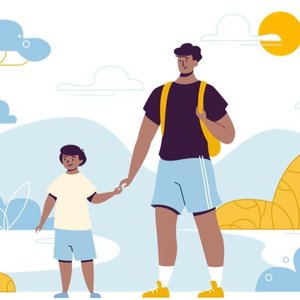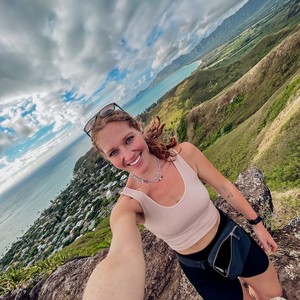Murali Krishna
"Go green"
POINTS TOTAL
- 0 TODAY
- 0 THIS WEEK
- 1,447 TOTAL
participant impact
-
UP TO1.0energy auditconducted
-
UP TO64plastic bottlesnot sent to the landfill
-
UP TO30poundswaste composted
-
UP TO1.0water footprintcalculated
-
UP TO1.0hourvolunteered
-
UP TO2.0community eventshosted or attended
-
UP TO2.0public officials or leaderscontacted
-
UP TO30advocacy actionscompleted
-
UP TO2.0treesplanted
-
UP TO967minutesspent learning
Murali's actions
Biodiversity + Wildlife
Invest in Nature
A healthy world needs both our daily actions and support from larger systems. I will spend 31 minutes learning about how I can use my investments and savings to advance environmental sustainability.
Biodiversity + Wildlife
Plastic in Clothing and Water
Synthetic clothing can contain plastic and shed harmful microplastics into our water. I will use a microplastics catcher in my laundry, or install a microplastics filter for my washing machine.
Biodiversity + Wildlife
Save the Bees
Bees are vital to ecosystems. To help save the bees, I will learn which local flowers provide nectar and plant them in my backyard or in a pot on my balcony.
Freshwater + Oceans
Cooking Oil Disposal
Pouring cooking oil down the drain can cause damage to waterways and ecosystems. I will learn how to properly dispose of cooking oil to help support healthy ecosystems.
Freshwater + Oceans
Smart Seafood Choices
We need to support healthy seafood populations. I will spend 3 minutes learning about sustainable seafood choices, commit to making better seafood choices for a healthier ocean, and share what I learned on the feed.
Freshwater + Oceans
Low Water Gardening
Grass lawns are water-intensive and on average require about 30 percent of a household’s water consumption. Native plants are water-efficient and help maintain the balance and diversity of local ecosystems. I will plant native species with water-efficient plants to conserve water and improve the habitat, then post a photo on the feed to share.
Freshwater + Oceans
Use a Reusable Water Bottle
Itr's estimated over a billion water bottles are thrown away each year. Even if they were recycled, that still uses energy and resources from the earth. I will use a reusable bottle and stop purchasing bottled water, saving 2 disposable plastic bottle(s) a day.
Freshwater + Oceans
Reduce Pollutants in Cleaning
Understanding cleaning product ingredients and their effect on water and biodiversity is helpful to our consumer choices. I will spend 60 minutes learning about how cleaning products affect our water and try making my own cleaning products to reduce pollutants.
Freshwater + Oceans
Go Plastic-Free
Millions of tons of plastic is produced each year worldwide. Each day, I will conduct a plastics audit of what I buy and use throughout the challenge (kitchen, bathroom, personal care products, etc.), to see how single-use plastic shows up in my life. I will find plastic-free alternatives to these products and advocate for alternatives to single-use packaging at local grocery stores, product manufacturers, at work, or on campus.
Freshwater + Oceans
Understand My Water Footprint
Each of us has a water footprint, directly linked to our daily activities as well as the water required in the production of things we use each day. Understanding our water use is important for a healthy planet. I will calculate my water footprint and look for a few ways I can reduce consumption or waste, then share what I learned on the feed.
Action Track: Community
Raise Awareness for the Conservation of Freshwater and Oceans
I will spend 30 minutes learning more about the importance of freshwater + ocean conservation, and how I can reduce my water use. I will share what I learn with people in person, on social media, and on the feed.
Action Track: Community
Pick Up the Phone
I will gather a group of friends, family, neighbors or colleagues to make 3 phone calls to public officials or companies to advocate for planet-friendly policies.
Action Track: Community
Borrow Before I Buy
Why buy something I will only use once or a few times if someone nearby has it for me to borrow, and why not share something I have that someone may only need a few times a year? To reduce my consumption and waste, I will create or support the sharing economy with friends, family, colleagues or neighbors.
Action Track: Community
Plant Trees
Trees capture carbon and produce oxygen that is essential to life on earth. I will support this important piece of nature by organizing or joining a community group to plant 3 native trees in my community, public parks, office location, campus or backyard.
Action Track: Community
Join a Cleanup Effort
I will organize or participate in a trash pickup at a local river, beach, or natural body of water.
Action Track: Community
Volunteer in my Community
I will volunteer 3 hours in my community.
Climate + Air
Online Energy Audit
Energy use and waste is often invisible. I will complete an online energy audit of my home, office, or dorm room and identify my next steps for saving energy.
Climate + Air
Sustainability Lunch and Learn
Learning in a social setting can inspire connection and change. I will work with a friend or colleague to plan and host a lunch and learn at work, school, in my neighborhood or other location to learn more about an environmental topic important to me. After the lunch and learn, I will share more about it on the feed.
Land + Forests
Carry My Trash
I will carry all of my unrecyclable, non-compostable trash with me this month, to raise my awareness of how much I send to the landfill. I will post on the feed my reflections, conversations, and actions I will take moving forward.
Land + Forests
Compost Food Waste
Food in the landfill is one of the main sources of greenhouse gasses. I will avoid sending up to .69 lbs (.31 kg) of food waste to the landfill per day by composting my food.
Land + Forests
Share My "Why"
I will record a video to share why I am taking action this Earth Month, a sustainable swap I've made, and/or a local conservation effort in my area.
Action Track: Community
JOIN OR CREATE A GREEN TEAM AT EMERSON
I will continue to contribute to Emerson's environmental sustainability goals beyond April by learning more about the Global Green Teams Network, joining a team near me, or maybe even creating a new team.
Action Track: Community
SIGN UP TO RECEIVE NEWS ON SUSTAINABILITY AT EMERSON
I will sign up to the Sustainability Aficionados distribution list to receive global news on sustainability at Emerson, including world news and Greening OF, BY, and WITH news.
Action Track: Community
TAKE PICTURES AND SHARE ON LINKEDIN
I will take at least one photograph that is connected with this year's theme of Nature Conservation & Biodiversity (for example an urban park, bee hives, birds and other animals...) and I will post it on LinkedIn with the hashtags #EarthMonthEcochallenge #EarthMonthAtEmerson.
Action Track: Community
ATTEND THE ECOCHALLENGE CONSERVATION WEBINAR
On Wed 24th April, I will attend the Earth Month Ecochallenge Webinar on Conservation to learn about what individuals, companies and other organizations can do to promote biodiversity and nature protection.
Participant Feed
Reflection, encouragement, and relationship building are all important aspects of getting a new habit to stick.
Share thoughts, encourage others, and reinforce positive new habits on the Feed.
To get started, share “your why.” Why did you join the challenge and choose the actions you did?
-
 Murali Krishna 4/30/2024 8:57 AMNothing compares to nature's beauty.
Murali Krishna 4/30/2024 8:57 AMNothing compares to nature's beauty.-
 Keyla Ahrens 4/30/2024 9:03 AM100% agree
Keyla Ahrens 4/30/2024 9:03 AM100% agree
-
-
REFLECTION QUESTIONAction Track: Community Pick Up the PhoneWhat do all of us have in common, regardless of politics, race, religion, occupation, or place we live? How can finding common ground help us as a society and as a species?
 Murali Krishna 4/30/2024 8:43 AMearth - the only thing we all have in common, regardless of politics, race, religion, occupation, or place we live.
Murali Krishna 4/30/2024 8:43 AMearth - the only thing we all have in common, regardless of politics, race, religion, occupation, or place we live. -
REFLECTION QUESTIONAction Track: Community Raise Awareness for the Conservation of Freshwater and OceansWhat did you learn about freshwater and oceans you did not already know? In sharing this information with people in your life, which conversation was impactful to you?
 Murali Krishna 4/30/2024 8:41 AMFreshwater ecosystems inland water bodies such as rivers, lakes, wetlands and groundwater aquifers, and their biodiversity, are among the most threatened on the planet. They are also fundamentally connected to, and interdependent on, other blue ecosystems along our coasts and in the ocean.As the global human population grows and develops so too, does the demand for fresh water for drinking and sanitation, hygiene and recreation, growing food, providing energy, and supporting biodiversity. At the same time, human activity and climate change are disrupting natural water cycles, putting freshwater ecosystems under increasing pressure.
Murali Krishna 4/30/2024 8:41 AMFreshwater ecosystems inland water bodies such as rivers, lakes, wetlands and groundwater aquifers, and their biodiversity, are among the most threatened on the planet. They are also fundamentally connected to, and interdependent on, other blue ecosystems along our coasts and in the ocean.As the global human population grows and develops so too, does the demand for fresh water for drinking and sanitation, hygiene and recreation, growing food, providing energy, and supporting biodiversity. At the same time, human activity and climate change are disrupting natural water cycles, putting freshwater ecosystems under increasing pressure.
-
REFLECTION QUESTIONAction Track: Community Raise Awareness for the Conservation of Freshwater and OceansWhat did you learn about freshwater and oceans you did not already know? In sharing this information with people in your life, which conversation was impactful to you?
 Murali Krishna 4/30/2024 8:41 AMFreshwater ecosystems inland water bodies such as rivers, lakes, wetlands and groundwater aquifers, and their biodiversity, are among the most threatened on the planet. They are also fundamentally connected to, and interdependent on, other blue ecosystems along our coasts and in the ocean.As the global human population grows and develops so too, does the demand for fresh water for drinking and sanitation, hygiene and recreation, growing food, providing energy, and supporting biodiversity. At the same time, human activity and climate change are disrupting natural water cycles, putting freshwater ecosystems under increasing pressure.
Murali Krishna 4/30/2024 8:41 AMFreshwater ecosystems inland water bodies such as rivers, lakes, wetlands and groundwater aquifers, and their biodiversity, are among the most threatened on the planet. They are also fundamentally connected to, and interdependent on, other blue ecosystems along our coasts and in the ocean.As the global human population grows and develops so too, does the demand for fresh water for drinking and sanitation, hygiene and recreation, growing food, providing energy, and supporting biodiversity. At the same time, human activity and climate change are disrupting natural water cycles, putting freshwater ecosystems under increasing pressure.
-
REFLECTION QUESTIONAction Track: Community Borrow Before I BuyHow did you participate in the sharing economy? (Consider posting a photo!) What are the benefits of a sharing economy? How could a sharing economy change the dynamics you have with friends, family and/or neighbors?
 Murali Krishna 4/30/2024 8:40 AMThe exchange of goods and services between consumers means we buy fewer items overall. This means there is less of a need to manufacture new products - cutting pollution and waste across the whole supply chain.
Murali Krishna 4/30/2024 8:40 AMThe exchange of goods and services between consumers means we buy fewer items overall. This means there is less of a need to manufacture new products - cutting pollution and waste across the whole supply chain. -
REFLECTION QUESTIONLand + Forests Compost Food WasteNew to composting? Be sure to check out the action resource links to learn tips and more about it. As you transition from throwing food away to composting, what do you notice about how much you are tossing? How will you use your compost once it is ready?
 Murali Krishna 4/30/2024 8:37 AMFood and garden waste can be captured and turned into compost. Composting is no longer just the domain of the home gardener or eco-warrior.
Murali Krishna 4/30/2024 8:37 AMFood and garden waste can be captured and turned into compost. Composting is no longer just the domain of the home gardener or eco-warrior. -
REFLECTION QUESTIONLand + Forests Carry My TrashThis is no small task! What was eye-opening to you throughout this action? How will you change your actions going forward to reduce the waste you produce?
 Murali Krishna 4/30/2024 8:35 AMhere are many practical ways to reduce waste and curb the overflow of toxic pollutants in landfills, such as:
Murali Krishna 4/30/2024 8:35 AMhere are many practical ways to reduce waste and curb the overflow of toxic pollutants in landfills, such as:- 1. Buy fresh produce. When possible, opt to buy fresh fruits and veggies when you head to the grocery store. Fresh produce doesn’t come with extra packaging waste, which can reduce the amount of plastic you throw away. Reuse fabric or cloth bags to carry fresh produce, so you don’t have to use the plastic produce bags in the store.
- 2. Compost. Much of the food waste we produce, like eggshells or fruit peels, are compostable materials. Under the right conditions, composting can turn your food scraps into pure organic nutrition without all the harmful methane byproducts. Incorporating compost into your home garden is a natural way to mulch your soil, rather than using chemical store-brand versions.
- 3. Eliminate single-use items. Single-use plastics or paper goods like utensils, straws, paper towels, and plastic bottles contribute to much of the garbage and pollution plaguing our planet. Instead, utilize reusable items like metal cutlery or cloth napkins to reduce the amount of paper and plastic waste you generate with every meal. Keep your own reusable water bottle on hand rather than buying new bottles from the grocery store.
- 4. Recycle. Recycling is the process by which used materials are converted into new products. There are many ways to recycle, from DIY repurposing old objects to sending used materials to facilities. Recycling cuts down on our need to harvest resources, helping to save energy, minimize greenhouse gas emissions, and reduce deforestation over time. Learn more in our beginner’s guide to recycling.
-
 Anna Butler 4/30/2024 8:39 AMso insightful, and helpful to the individual as well as the environment!
Anna Butler 4/30/2024 8:39 AMso insightful, and helpful to the individual as well as the environment!
-
REFLECTION QUESTIONFreshwater + Oceans Go Plastic-FreeWhere did plastic show up on your life that surprised you the most? What plastic alternative products did you discover you may switch to?
 Murali Krishna 4/30/2024 8:34 AMThe only kinds of plastic that have been in the news globally and have been giving environmentalists sleepless nights are the thin, single-use shopping bags and water and cold drink bottles that are indiscriminately discarded by users. They take up landfill spaces, enter water bodies and in the process of degrading, release toxic chemicals which mix with the soil and water and are a threat to life and environment.
Murali Krishna 4/30/2024 8:34 AMThe only kinds of plastic that have been in the news globally and have been giving environmentalists sleepless nights are the thin, single-use shopping bags and water and cold drink bottles that are indiscriminately discarded by users. They take up landfill spaces, enter water bodies and in the process of degrading, release toxic chemicals which mix with the soil and water and are a threat to life and environment. -
REFLECTION QUESTIONFreshwater + Oceans Use a Reusable Water BottleWhat did you learn about the amount of plastic we consume and what actions will you take to reduce your use of plastic?
 Murali Krishna 4/30/2024 8:32 AMCertainly! The amount of plastic we unwittingly consume is quite staggering. Let’s delve into the details:
Murali Krishna 4/30/2024 8:32 AMCertainly! The amount of plastic we unwittingly consume is quite staggering. Let’s delve into the details:- Microplastics Ingestion:
- Microplastics, those tiny particles smaller than five millimeters, are ubiquitous. They’re found in the sea, beach sand, and even within us.
- These particles come from various sources, including food, water, and air. For instance:
- People who meet their recommended water intake through tap water ingest an additional 4,000 plastic particles annually.
- Health Impacts:
- The health effects of plastic consumption are concerning:
- Endocrine Disruption: Chemicals in plastic, such as bisphenols and phthalates, can disrupt our endocrine system, affecting hormones and leading to neurodevelopmental problems, metabolic disorders, and reproductive issues.
- Toxic Properties: Some plastics contain carcinogens, neurotoxic chemicals, and endocrine-disrupting substances.
- Unknown Tolerance: Scientists are still uncertain about the safe threshold for microplastics in our bodies.
- The health effects of plastic consumption are concerning:
- Actions to Reduce Plastic Use:
- As an AI language model, I don’t personally consume plastic, but I can offer suggestions:
- Reusable Alternatives: Opt for reusable bags, bottles, and containers to reduce single-use plastic.
- Avoid Excessive Packaging: Choose products with minimal plastic packaging.
- Recycle Properly: Ensure proper recycling of plastic items.
- Support Legislation: Advocate for policies that curb plastic pollution.
- Educate Others: Spread awareness about the impact of plastic on our health and the environment.
- As an AI language model, I don’t personally consume plastic, but I can offer suggestions:
Remember, every small step counts in our collective effort to minimize plastic consumption. - Microplastics Ingestion:
-
REFLECTION QUESTIONFreshwater + Oceans Cooking Oil DisposalDid anything about this action surprise you? Do you use more or less oil than you thought?
 Murali Krishna 4/30/2024 8:30 AMproper disposal helps protect our environment and prevents plumbing issues.
Murali Krishna 4/30/2024 8:30 AMproper disposal helps protect our environment and prevents plumbing issues.